Introduction to Dogs with Allergies
Many pet owners worry about Best Food for Dogs with Allergies. They affect both humans and their furry pets. People cherish dogs as family members. But their dander, saliva, and urine trigger allergies in some. Understanding dog allergies is essential. It helps in providing the best care to pets and their owners.
Symptoms of Dog Allergies
Recognizing the symptoms of dog allergies is crucial for prompt intervention and management. Common signs include sneezing, coughing, wheezing, itching, watery eyes, and skin rashes. In severe cases, allergic reactions can manifest as asthma attacks or hives. The symptoms may vary in intensity. This depends on the person’s sensitivity to and exposure to allergens.
Causes of Dog Allergies
Dog allergies come from the body’s immune system. It overreacts to proteins found in canine saliva, dander, urine, and even hair. Proteins such as Can f 1 and Can f 2, present in dog saliva and dander , are notorious allergens. Also, some breeds may produce more allergenic proteins. This makes allergic reactions worse for sensitive people.
Diagnosis and Treatment
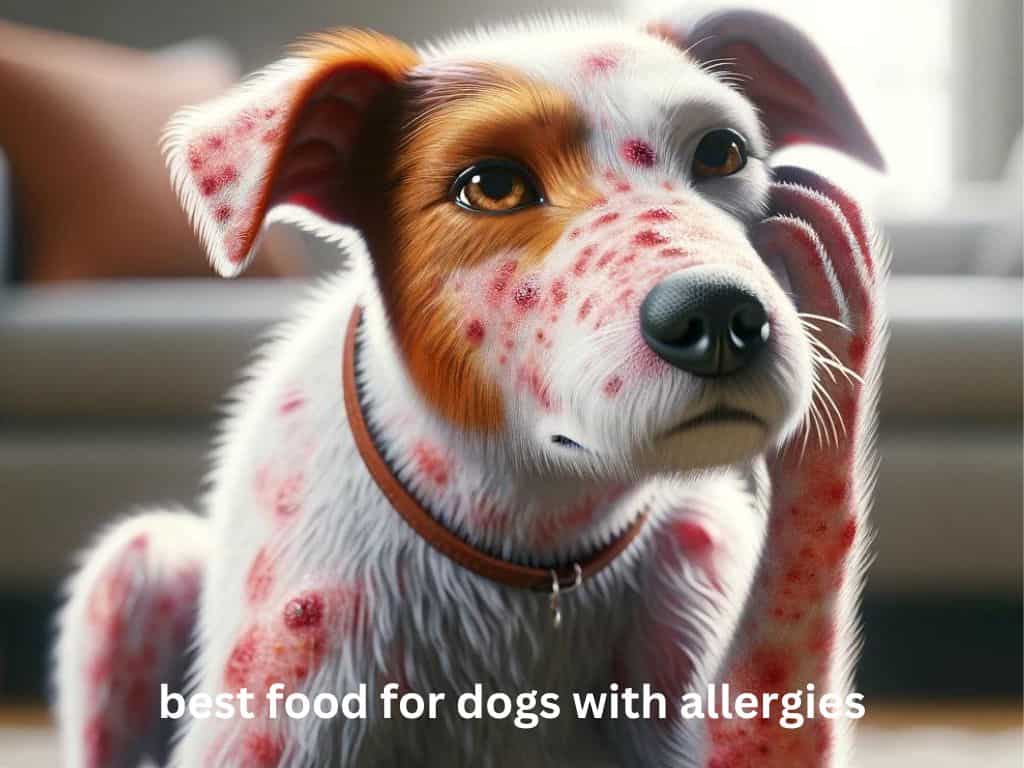
Diagnosing dog allergies involves a comprehensive evaluation by an allergist. This may include skin prick tests or blood tests. It may also include elimination diets to find specific allergens causing the reaction. Once diagnosed, you have many treatment options. They can help manage symptoms and improve quality of life. These may include antihistamines and corticosteroids. They may also include allergy shots or lifestyle changes to reduce allergen exposure.
Preventive Measures
Preventing dog allergies requires a multifaceted approach. Grooming and bathing pets often. It can reduce dander and saliva allergens. Using high-efficiency particulate air (HEPA) filters in homes can cut airborne allergens. You can also consider alternative pets, like fish or reptiles. They may also be suitable for those with severe allergies.
Dog allergies pose significant challenges for both pet owners and allergy sufferers. By understanding the symptoms, causes, and diagnosis, individuals can manage dog allergies. They can also learn about treatment options. They can then enjoy their dog’s company. They can do so without risking their health. Taking preventive measures and seeking guidance from healthcare professionals are crucial steps. They ease dog allergies. They also foster harmony between humans and their furry friends.
Identifying Best Food for Dogs with Allergies
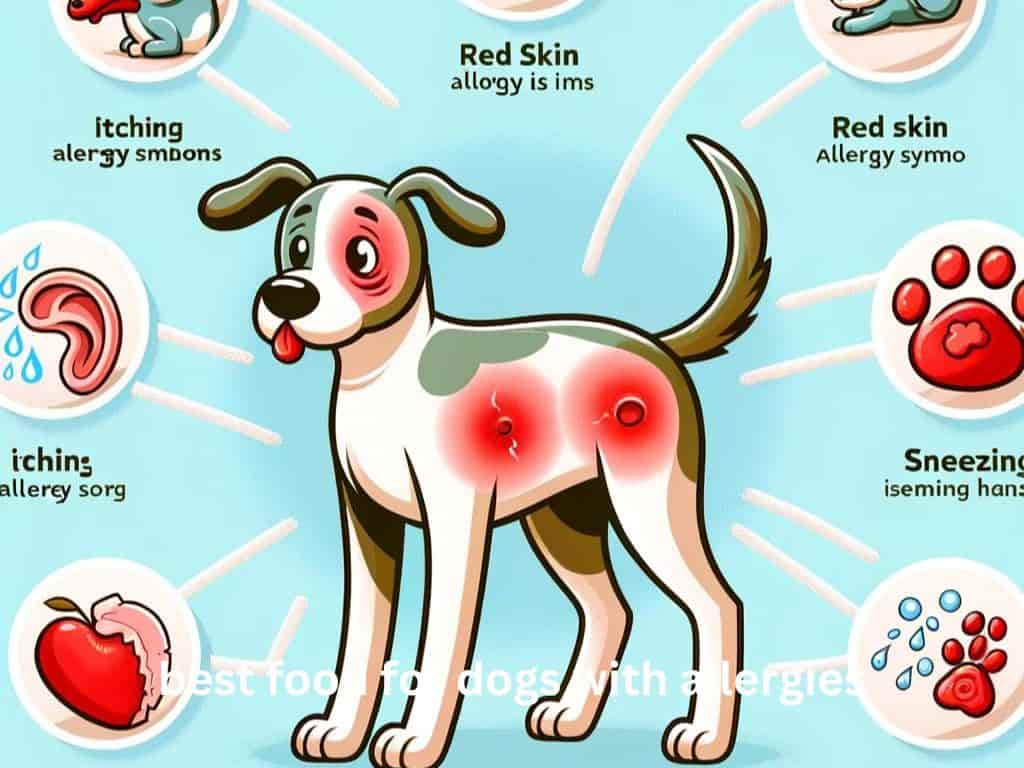
Food allergies can impact the health and well-being of our beloved canine companions. Identifying and addressing these allergies is essential for ensuring their comfort and vitality. In this article, we’ll see how to spot the signs of Best Food for Dogs with Allergies. Then, we’ll take the needed steps to manage them.
Signs of Food Allergies in Dogs
Recognizing the symptoms of food allergies in dogs is crucial for early intervention. Common signs include itching, scratching, licking, and biting of the skin. This happens around the face, ears, paws, and rear end. Digestive issues such as vomiting, diarrhea, or gassiness may also say food allergies. Recurring ear infections and skin infections can also suggest a food allergy.
Common Food Allergens for Dogs
Several ingredients in commercial dog food can trigger allergies in sensitive dogs. These include proteins such as beef, chicken, lamb, and fish, as well as grains like wheat, corn, and soy. Artificial additives, preservatives, and food colorings may also contribute to allergic reactions. Identifying and removing potential allergens from the dog’s diet is crucial. It helps to manage food allergies.
Diagnosing Food Allergies
Diagnosing food allergies in dogs often involves a process of elimination. Your vet may recommend a food trial. During it, your dog will eat a new protein and carb diet for several weeks. If symptoms improve during this trial and return when the old diet is back, it indicates a food allergy. In some cases, blood tests or skin tests may also help identify specific allergens.
Managing Food Allergies in Dogs
Once a doctor diagnoses a food allergy. Managing it requires picking and following a suitable diet. Switching to a hypoallergenic or limited ingredient diet can help cut allergic reactions. Avoiding treats and table scraps containing potential allergens is also crucial. You must check your dog’s symptoms. You must also consult your veterinarian for guidance. These actions are essential for effective management.
Finding food allergies in dogs requires attentiveness to their symptoms. It also needs a systematic approach to diagnosis and management. Pet owners can help their furry friends. They can do this by understanding the signs and common allergens. They can give them the care and support they need. This will help them to live happy, healthy lives without the discomfort of food allergies. Always ask a vet for personalized advice. They can suggest treatments tailored to your dog’s needs.
.
Importance of Choosing the Right Food for Dogs with Allergies

Choosing the right food for dogs with allergies is key. It’s vital to their health and well-being. Dogs can have various allergies. These range from skin irritations to digestive issues. The food they eat plays a big role in managing these conditions. In this article, we’ll cover the importance of picking the right food for dogs with allergies. We’ll also cover how it can impact their quality of life.
Addressing Specific Allergens
Most commercial dog foods contain common allergens. These include beef, chicken, wheat, and soy. They can make allergies worse in sensitive dogs. Choosing hypoallergenic or limited ingredient diets can help. They do this by removing potential allergens from the food. These diets use unusual proteins and easy-to-digest carbs. This reduces the chance of causing allergies.
Minimizing Symptoms and Discomfort
The right food can ease the symptoms associated with food allergies in dogs. A balanced diet without allergens can help. It can reduce itching, scratching, and upset stomachs in allergic dogs. Also, choosing good, healthy ingredients can support health and boost the immune system. This further aids in managing allergies.
Promoting Long-Term Health
Good nutrition is vital for maintaining the long-term health of dogs with allergies. It also keeps them vital. Feeding them a diet tailored to their needs can prevent allergic reactions. It can also reduce the need for medication.
Also, a healthy diet supports:
- healthy skin and coat
- a strong digestive system
- better resistance to allergens and other stressors.
Consulting with a Veterinarian
When picking food for dogs with allergies, you must consult a vet. A pro can give customized recommendations. We will base them on your dog’s sensitivities and dietary needs. They may also suggest allergy testing. Or, they may suggest dietary trials to find specific allergens. Then, they will create a feeding plan.
Choosing the right food for dogs with allergies is key. It helps manage their condition and ensure a happy, healthy life. By dealing with specific allergens, they can reduce symptoms and promote long-term health. This will help their allergic dog. With good food and guidance from a vet, dogs with allergies can have a comfy life. They can be free from the burden of allergic reactions.
Ingredients to Food Avoid in Dog for Allergies
In managing food allergies in dogs, avoiding some ingredients is crucial. They prevent allergic reactions and promote the dogs’ well-being. Some common ingredients known to trigger allergies in dogs include:
1. Beef:Beef is a common allergen for dogs. It can cause skin irritations, digestive issues, and other allergic reactions.
2. Chicken: Chicken is another prevalent allergen found in commercial dog foods. Dogs allergic to chicken may experience itching, vomiting, diarrhea, and other symptoms.
3. Wheat:Some dogs can have allergic reactions to wheat and other grains that contain gluten. This can cause skin problems, stomach issues, and discomfort.
4. Corn:Corn is often used as a filler in dog food. But, it can trigger allergies in sensitive dogs. This causes skin rashes, itching, and digestive issues.
5. Soy:Soy is another potential allergen for dogs. It may cause skin irritation, digestive issues, and allergies.
6. Dairy:Dogs with allergies can have trouble with dairy, like milk and cheese. They can cause digestive upset and other allergic symptoms.
Avoiding these ingredients helps. Instead, opt for hypoallergenic or limited ingredient diets. This can cut allergic reactions. It can also improve the health of dogs with food allergies. Always ask a vet for personalized dietary recommendations. Tailor them to your dog’s needs.
Best Food Options for Dogs with Allergies
Finding the best food for dogs with allergies is essential. It will ease their discomfort and improve their quality of life. Here are some top choices to consider:
Hypoallergenic Diet
Opting for a hypoallergenic diet is often the best approach for dogs with allergies. These diets use novel protein sources like duck, venison, or rabbit. These meats are less likely to trigger allergies. Additionally, hypoallergenic diets may contain limited ingredients to minimize exposure to potential allergens.
Limited Ingredient Diet (LID)
LID dog foods have a short list of chosen ingredients. This makes it easier to find and avoid allergens. These diets have one protein source and few carbs. This reduces the risk of triggering allergies.
Grain-Free Options
Some dogs have allergies. They may enjoy grain-free diets. Grains like wheat, corn, and soy cause most pet allergies. Grain-free dog foods use carbs like sweet potatoes, peas, or lentils. They provide a hypoallergenic option for dogs with grain sensitivities.
Novel Protein Sources
Introducing new protein sources can help manage your dog’s allergies. They are sources your dog hasn’t had before and can be beneficial. Look for dog foods containing proteins such as fish, turkey, or kangaroo. These are less likely to cause allergies in sensitive dogs.
Homemade Diets
Pet owners can make homemade diets with fresh, whole ingredients. This can be a good option for those who want more control over their dog’s diet. Ask a vet or dog nutritionist for help. They will ensure that they balance your dog’s diet. It meets their needs and avoids common allergens.
By picking the best food for dogs with allergies, pet owners can help reduce symptoms. They can also improve their dog’s health and enhance their quality of life. Always consult with a vet before making big dietary changes. This will ensure the best outcome for your furry friend.
Homemade Dog Food Recipes for Allergies
Homemade dog food recipes can be a great option for dogs with allergies. They give owners control over ingredients. They ensure their pet gets a balanced, allergen-free diet. Here are some homemade dog food recipes tailored for dogs with allergies:
- Turkey and Sweet Potato Stew:
Ingredients:
- 1 lb ground turkey
- 2 cups diced sweet potatoes
- 1 cup diced carrots
- 1 cup diced green beans
- 4 cups low-sodium chicken broth
Instructions:
- In a large pot, brown the ground turkey over medium heat until cooked.
- Add diced sweet potatoes, carrots, green beans, and chicken broth to the pot.
- Bring the mixture to a boil, then reduce heat and simmer for 20-25 minutes until vegetables are tender.
- Allow the stew to cool before serving to your dog.
- Fish and Quinoa Delight:
Ingredients:
- 1 lb boneless, skinless fish fillets (such as salmon or trout)
- 1 cup quinoa, rinsed
- 2 cups low-sodium vegetable broth
- 1 cup diced zucchini
- 1 cup diced bell peppers
Instructions:
- Cook quinoa according to package instructions, using vegetable broth instead of water.
- In a separate pan, sauté fish fillets until cooked through.
- Flake the cooked fish and mix it with cooked quinoa, diced zucchini, and bell peppers.
- Allow the mixture to cool before serving to your dog.
- Lamb and Rice Casserole:
Ingredients:
- 1 lb ground lamb
- 2 cups cooked brown rice
- 1 cup diced butternut squash
- 1 cup peas
- 2 cups low-sodium beef broth
Instructions:
- Brown the ground lamb in a skillet over medium heat until cooked.
- In a large bowl, mix cooked lamb with brown rice, diced butternut squash, peas, and beef broth.
- Transfer the mixture to a baking dish and bake at 350°F for 25-30 minutes until squash is tender.
- Allow the casserole to cool before serving to your dog.
These homemade dog food recipes are nutritious, allergen-free options for dogs with sensitivities. Always ask a vet or canine nutritionist for advice. They will check if the recipes meet your dog’s diet. They will also discuss any potential allergens.
Commercial Dog Food Brands for Allergies
When it comes to dog allergies, the right commercial dog food brands can affect their health. Here are some of the top brands known for offering options tailored to dogs with allergies:
Hill’s Prescription Diet
Hill’s offers a range of prescription diets. They make them to address specific health concerns, including food allergies. Their Prescription Diet z/d Ultra line features hydrolyzed protein. This protein reduces allergic reactions. It is a great choice for dogs with food sensitivities.
Royal Canin Veterinary Diet
Royal Canin offers veterinary diets. We design the diets to manage health conditions, including food allergies. Their Veterinary Diet Hydrolyzed Protein formula has proteins broken into smaller parts. This reduces the risk of triggering allergies in sensitive dogs.
Purina Pro Plan Veterinary Diets
Purina Pro Plan Veterinary Diets offers hypoallergenic options for dogs with food allergies. Their HA-hydrolyzed formula has digested proteins and carbs. It’s good for dogs with sensitive digestion and skin issues.
Blue Buffalo Basics Limited Ingredient Diet
The Blue Buffalo Basics Limited Ingredient Diet line has options with only a few chosen ingredients. This makes it easier to avoid potential allergens. These recipes are grain-free. They feature new proteins like turkey or salmon. They are for dogs with food sensitivities.
Wellness Simple Limited Ingredient Diet
Wellness offers a simple, limited diet for dogs with food sensitivities. The recipes feature only one animal protein and easy-to-digest carbs. This minimizes the risk of allergies and promotes digestion.
When picking a dog food for allergies, consult a vet. They will ensure the chosen formula meets your dog’s needs. Also, slow changes and careful monitoring of your dog’s response to the new diet are key. They are crucial for success in managing allergies well.
Tips for Transitioning to a New Diet
Moving to a new diet can be hard for dogs. This is especially true for dogs with allergies or sensitive stomachs. Here are some tips to help make the transition smoother:
Gradual Introduction
Start by introducing the new food alongside your dog’s current diet. Start with a bit of the new food mixed with the old food. Increase the amount of the new food over many days to weeks.
Slow Transition Period
Allow enough time for the transition, over a period of 7 to 10 days. This slow approach lets your dog’s gut adjust to the new food. It also cuts the risk of tummy upset.
Monitor Closely
Watch your dog closely during the transition. Look for signs of digestive upset, such as vomiting, diarrhea, or appetite changes. If any bad reactions occur, slow the transition. Or, consult your vet for guidance.
Stay Consistent
Maintain consistency in feeding times and portions throughout the transition period. Consistency helps your dog adjust to the new diet better. It also reduces stress on their digestion.
Provide Ample Water
Make sure your dog has fresh water at all times. This is especially true during the transition. Proper hydration supports healthy digestion. It helps ease any digestion issues from diet changes.
Patience and Persistence
Be patient during the transition. Some dogs may take longer to adjust to a new diet. Keep at it. introduce the new food. Do this until your dog switches to it.
Follow these tips. Take a gradual approach. It will help your dog switch to a new diet more . It will also reduce any digestive issues or allergic reactions. Always ask your vet for personalized advice. They can give recommendations tailored to your dog’s needs.
FAQs
1. Can dogs develop allergies to food?
Yes, dogs can develop allergies to some ingredients in their food. This can cause many symptoms. These include itching, digestive issues, and ear infections.
2. How can I identify if my dog has a food allergy?
Dogs show many common signs of food allergies. These include itching, chronic ear infections, and digestive problems. They also include excessive licking or chewing of paws.
3. What are some common allergens in dog food?
Dog food often has common allergens. These include grains (wheat, corn, soy), dairy, chicken, beef, and eggs.
4. Are there any commercial dog food brands specifically for dogs with allergies?
Yes, many dog food brands offer special formulas for dogs with allergies. These formulas often have few ingredients or novel protein sources.
5. Can I prepare homemade food for my dog with allergies?
Yes, homemade dog food can work for dogs with allergies. You need to pick ingredients and ensure a balanced diet.
Conclusion
Choosing the best food for dogs with allergies is essential. It helps manage their condition and improve their life. You can opt for commercial formulas or homemade recipes. But, choose ingredients and watch your dog’s response. This can affect their health and well-being.

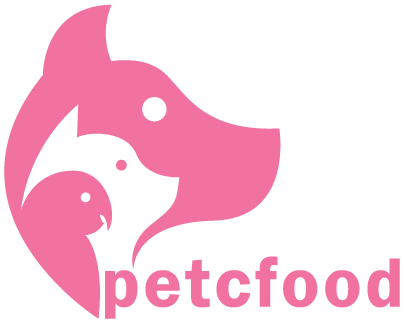
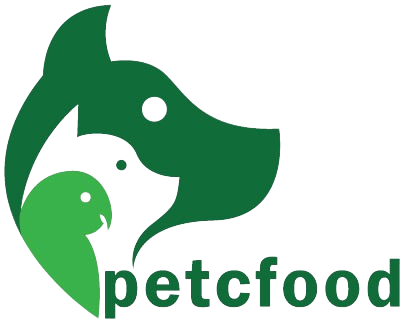








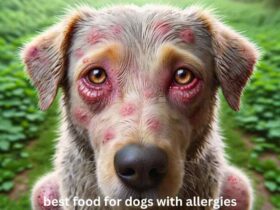


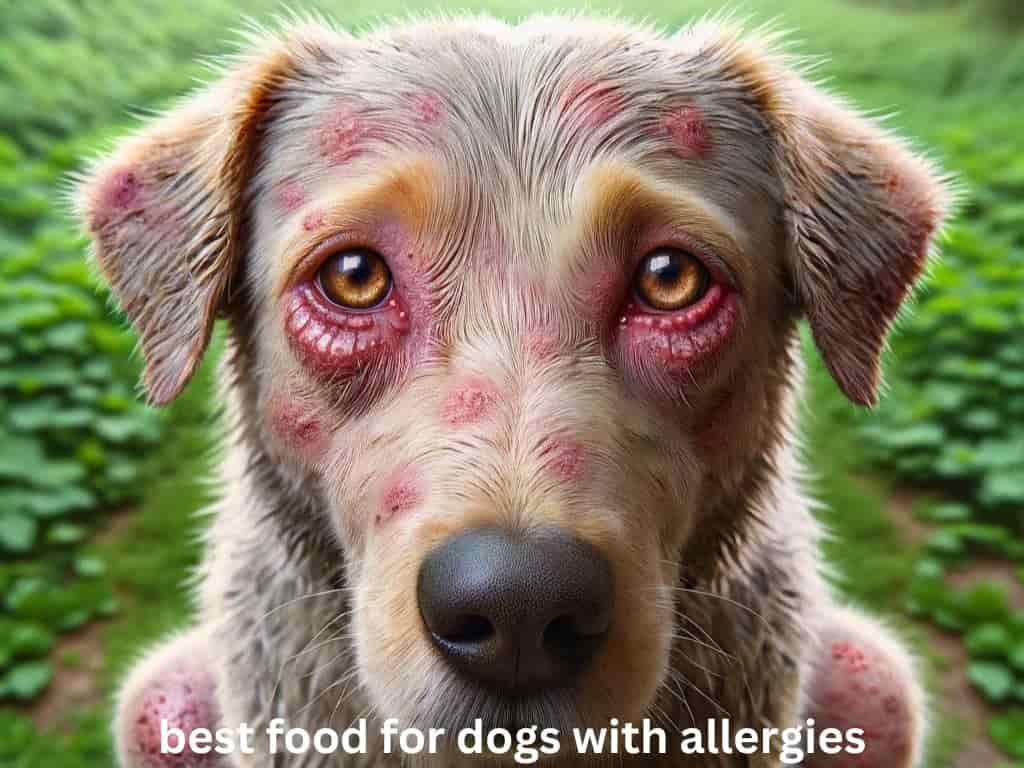
Leave a Review